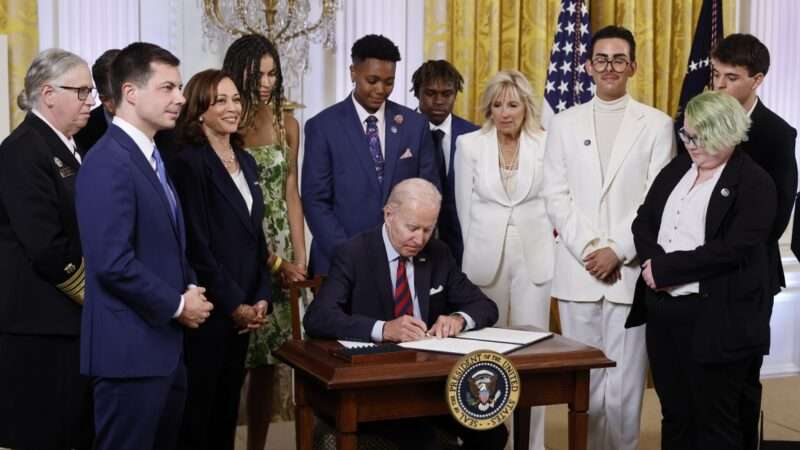
We've got 10 days left in Pride Month. That it takes place this year during an election cycle that has been heavily influenced by culture wars putting gay and particularly trans issues front and center has inexplicably brought back into politics some pretty old ideas about LGBT issues.
Over the weekend, the Republican Party of Texas voted to approve language in their 2022 platform declaring that "homosexuality is an abnormal lifestyle choice" and opposing "special legal entitlements or creation of special status for homosexual behavior." It further states they "oppose all efforts to validate transgender identity" and calls for the legal prohibition of medical treatments like puberty blockers, hormones, and surgery for any trans person under the age of 21.
There is a lot of stuff in the whole platform (and not all of it is bad). The addition of this LGBT component is notable for what a weird throwback it is, much of it reminiscent of how conservatives used to talk about gay marriage back in the 1990s.
State political platforms are also somewhat easy targets to draw out culture war tensions. They are mostly relevant to party primaries in states and may indicate the mood of influential party participants but not the actual desires of party voters. Not only do an overwhelming majority of Americans support legal recognition of same-sex marriage, but as of 2021, a majority of Republicans (55 percent) also support it. Gallup polling shows support for gay and trans rights improving steadily over the last two decades.
Nevertheless, we have seen many examples this month that the "woke left" aren't the only ones versed in virtue signaling. Drag brunch is not going to be the downfall of America, but saying so is certainly a way of drawing media attention and playing to a particular group of conservative voters, freedom and liberty be damned. There are a lot of complex reasons (and really bad government policies) behind our inflation and supply chain crisis, our actual domestic problems. RuPaul is not one of those reasons.
Last week President Joe Biden signed a lengthy executive order that shows his willingness to jump into this culture war on behalf of the Democratic Party. On June 15, he signed an "Executive Order on Advancing Equality for Lesbian, Gay, Bisexual, Transgender, Queer, and Intersex Individuals" that pushes the Secretary of Health and Humans Services to seek out ways to intervene against "harmful State and local laws" that target and restrict the access of LGBT citizens to medical care and treatment.
This is clearly a response to states passing laws that attempt to ban or criminalize medical treatment for trans teens and children. Similarly, the executive order calls for the Secretary of Education to attempt to intervene against any state laws they deem "harmful" to LGBT students and to "develop and release sample policies for supporting LGBTQI+ students' well-being and academic success in schools and educational institutions."
Incidentally, Biden is the first president to use the term "queer" in his executive orders, but it's not defined in the order. The term is generally not used in anti-discrimination laws precisely because it has become this vague umbrella term to the point that heterosexual people claim to be "queer." Its inclusion in the order is its own performative moment for the administration.
To the extent that new state laws fueled by culture warring might violate the rights of LGBT citizens and run counter to federal law or Supreme Court rulings makes an executive order justifiable, though probably not necessary. Xavier Becerra, current Secretary of Health and Humans Services, doesn't need any encouragement to go around filing lawsuits. That's what he's known for.
But that's not all the executive order does. It calls for the feds to wade into the political fight over conversion therapy (the controversial theory debunked by medical experts that homosexuality and trans identity can be "cured") and asks the Federal Trade Commission to determine whether the practice is fraudulent and requires consumer warnings.
Paragraph after paragraph calls for more federal research and working groups on LGBT health issues and whether LGBT people are more likely to have to deal with homelessness, have problems with accessing social services, determine whether older LGBT folks have issues with long-term care, et cetera. A lot of the executive order is a wish list that affirms an LGBT-friendly and expansive bureaucratic state.
And so the culture war politics involved here are a partisan fight over what will be forbidden and what will be mandated, and being left alone is just not an option on the table. Drag queens and trans athletes have to be presented as some massive cultural threat on one side, while LGBT people (and "queer" people, whoever they might be if not LGBT people) as a whole need to be collectively classified as hapless children to justify a set of unneeded government interventions by the other.
The post As Pride Month Nears End, LGBT Political Culture Warring Escalates appeared first on Reason.com.







